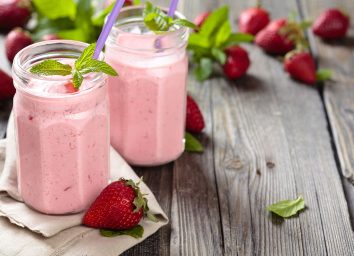The #1 Drink to Avoid to Lose Weight, According to Science

Oftentimes, the easier way to approach weight loss is to add—not take away. Start exercising (even a walk a day will do it); add healthy fruit, vegetables, and whole grains; drink more water… Eventually, by starting these healthy habits, you’ll start to displace the less-than-good-for-you things you’ve been doing and eating. However, there is one drink to consider cutting out of your diet immediately when you commit to losing weight, as it’s the beverage most closely linked to weight gain in America: soda.
According to a study published in the journal BMC Public Health, 20% of the total calories you consume in a day come entirely from beverages. For the average person consuming 2,000 calories a day, that’s about 400 calories added to your diet from beverages alone. So what exactly makes up those 400 calories? The BMC study found that it was a combination of coffee and tea (with the add-ins), energy drinks, fruit juice and drinks, milk, and alcohol. But these energy-dense beverages pale in comparison to the drink that ties for contributing the most calories to your diet: soda.
The study found that soda contributed anywhere between 35 to 141 calories to your diet per day, depending on your age.
It should come as no surprise that soda is linked to weight gain, as it contains roughly 150 calories per can.
Speaking of which, those calories are completely empty, coming entirely from sugar. In fact, a can of soda contains anywhere between 35 to 61 grams of sugar per can! (Related: 30 Worst Sodas That Are Never Worth Drinking.)
The average American adult consumes 13 pounds of sugar exclusively from soda every year. And studies show that consumption of sugar-sweetened beverages like soda contributes to weight gain in both adults and children. That’s especially the case as many sodas contain high-fructose corn syrup. Your body is only able to process the fructose from this sweetener through the liver, and it cannot use fructose for energy like it can with glucose. This contributes to even more weight gain along with metabolic disregulation and impaired glucose tolerance.
Through the years, dozens of studies have linked soda consumption to weight gain. And it gets worse: an International Journal of Behavioral Nutrition and Physical Activity study found that despite participants exercising if they consumed soda, they still gained weight. In other words, exercising won’t help you fend off the weight gain associated with drinking soda.
Soda isn’t just linked to weight gain, it also has a terrible effect on your overall health, as the beverage has been linked to type 2 diabetes, heart complications, depression, liver diseases, and risk of early death.
Because cutting back on calories—any calories from any food or beverage—will help you with weight loss, you don’t need to rely on removing soda alone from your diet to lose weight. That’s especially the case as fewer and fewer Americans drink soda on a regular basis (45.8% of U.S. residents surveyed in a recent study reported consuming no soda at all.) But if you are a soda drinker, you should seriously consider cutting back on your habit. Replace your bubbly drink with water, or try any of these 25 Healthy, Low-Sugar Soda Alternatives.
For more healthy eating news, make sure to sign up for our newsletter!








